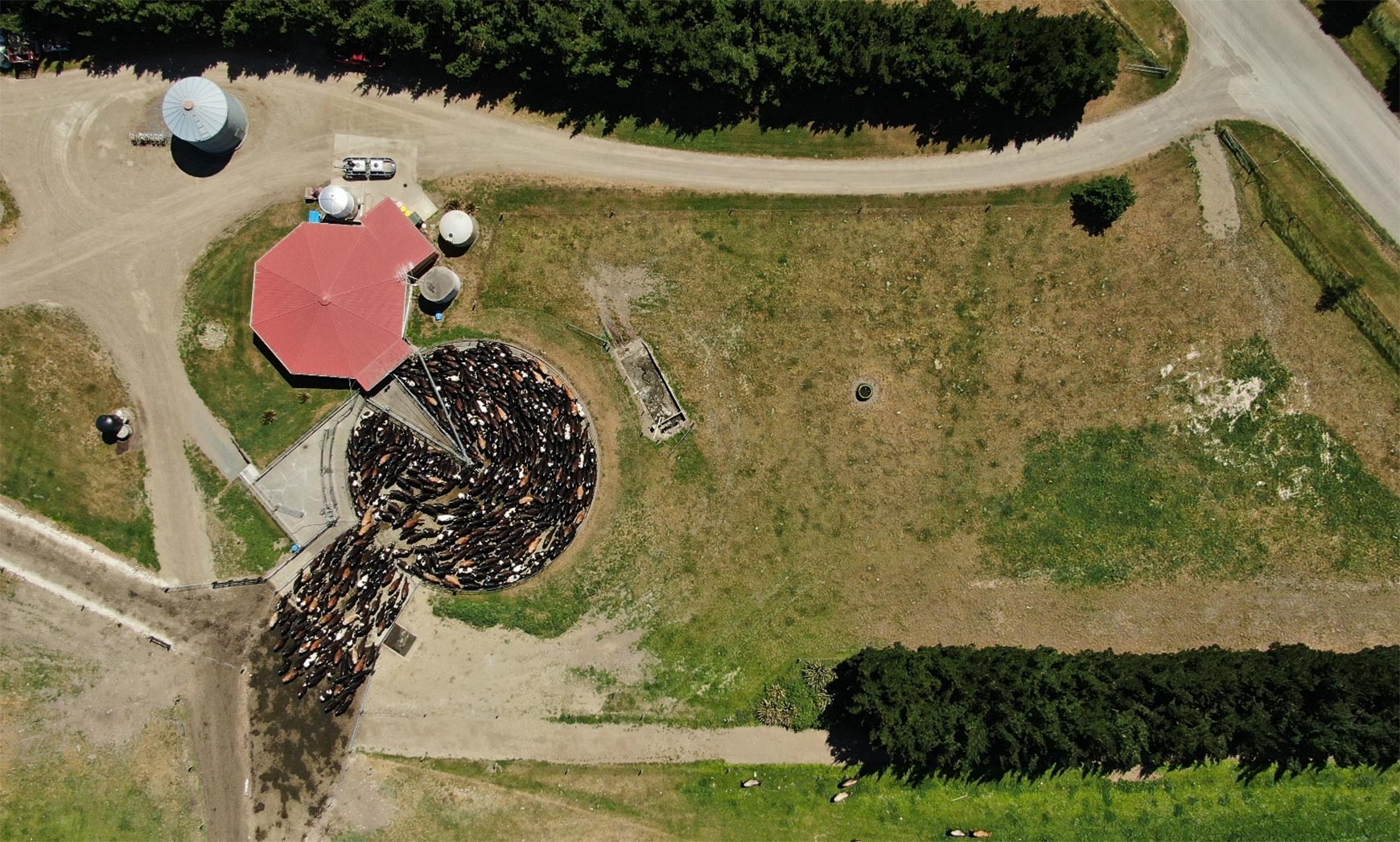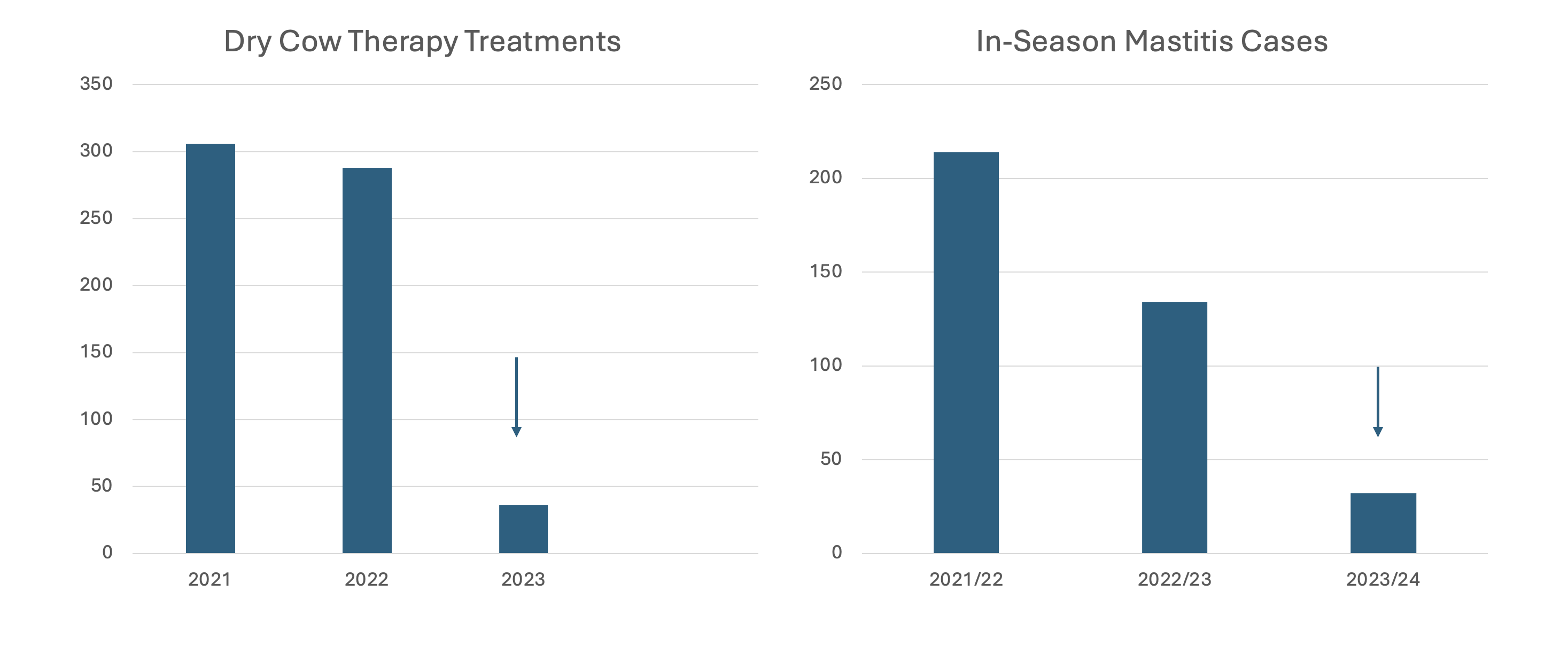Our Approach
Scientifically proven and data led.
Case study: Oscar Farming
Oscar Farming is a 2,200 cow operation based in Swannanoa, Canterbury. Owner Mike Prattley has been working with DairySmart for several years and in the 2021 dry-off used the DairySmart system to culture all of his cows to assist his decision to move from blanket dry cow therapy to selective dry cow therapy. Mike also installed our Jupiter machine in the shed for in-season mastitis diagnostics and got us involved with staff training and identification of any mastitis risk areas in his overall operation.
At first Mike felt that the costs of implementing DairySmart were off set by the savings of using far less antibiotics. However what he discovered was that once they knew what was going on with the cows, benefits began to flow into the next lactation. A large part of the success has been through managing contagious mastitis caused by Staph aureus: culling the cows it made sense to cull, treating the ones it made sense to treat & managing the ones we identified in a way that broke contagious transmission of the bugs. Problem cows are no longer spreading problem bugs to their herdmates and as a result the farm Dairy Antibiogram (penicillin) has dropped from 8 to 0.03. As Mike says “when we do treat them, we are treating the right bug with the right drug and now that the antibiotic resistance is down our results are better”.
Each season has seen the system get tighter and tighter. Mike is now culling less cows (from 27% down to less than 23%) and production has increased ~ 9% since 2020. Oscar Farming have improved their direct mastitis related animal health costs by over $30 per cow.
Oscar Farming transitioned from Blanket DCT to Selective DCT and adopted the DairySmart System 2020/21 Season.
90% Less Dry Cow
Antibiotics Used
55% Less
Mastitis In Season
33% Reduction
In SCC
Field study
EpiVets recently analyzed data obtained from 9 North Canterbury farms (4,185 cows) during the 2022 dry-off that used the DairySmart culture-based system. Our culture results were compared against the SCC data that the farmers would have otherwise given their veterinarian to assist with Selective Dry Cow Therapy decision-making.
Here’s what EpiVets found:
SCC data misses infected cows
- 628/4,185 (i.e 15%) of the cows grew a “major pathogen” on the DairySmart plates. Major pathogens are mastitis causing bacteria.
- However only 294 of these 628 infected cows would have been treated using the SCC algorithm. This possibly explains why many farmers experienced SCC creep and increased Clinical Mastitis when they tried to transition from blanket dry cow therapy to selective dry cow therapy in the past.
SCC data says “treat” too often.
- Another 852 cows had a SCC > 150,000. Of these cows, 361 cultured a “minor pathogen” and 491 did not grow any bugs at all.
- Many of these cows may not benefit from, or require, treatment. For example – in a 1,500-cow randomized clinical trial running in parallel to this field study, Mason et al. (in Press) found that not treating vs treating the “minor pathogen” and “no-growth” cows resulted in no-significant difference in Clinical Mastitis or SCC outcomes in the following lactation. Obviously there is no benefit treating a cow that does not have a bug.
- DairySmart insists farmers consult with their Veterinarian, and using our results alongside all of the other available data at their disposal, make the best treatment decisions for this subset of cows. By doing so significant reductions in dry cow therapy antibiotics are possible.
- In the 4,185 cow field study the above practice resulted in a 45% reduction in antibiotics.
* Summary of a randomised clinical Trial – Mason W.A et al, In Press AND an analysis of DairySmart field data from 2022 by EpiVets.

Accuracy
DairySmart identifies actual bugs in udders. This is significantly more accurate than using somatic cell count (SCC) data.
Less Antibiotics
DairySmart used up to 45% less antibiotics than if using herd tests. *
Non Inferior
DairySmart showed that there was no difference in SCC or Clinical Mastitis outcomes in the next lactation despite using far less antibiotics.
Farmer Confidence
95% of farmers using DairySmart thought antibiotic resistance was a significant motivator for doing so. Farmers care about their future.
Case study: Balgonie Dairy Farm
Balgonie Dairy Farm is a ~900 cow operation based in Rakaia, Canterbury. Contract Milker Jade Maddigan started working with DairySmart in the 2022/23 season & ran a whole herd Smart Screen before dry-off in 2023. Jade was already using a Selective Dry Cow Therapy strategy as per the SAMM Plan recommendations.
Jade also installed our Jupiter machine in the shed for in-season mastitis diagnostics and got us involved with staff training and identification of any mastitis risk areas in his overall operation.
Jade has more than recouped the costs of implementing DairySmart through the savings he has made by using far less antibiotics.
Like Oscar Farming above, Jade also discovered that the benefits of knowing what he was dealing with began to flow into the next lactation. Again, a large part of his success has been through managing contagious mastitis caused by Staph aureus: culling the cows it made sense to cull, treating the ones it made sense to treat; managing the ones we identified in a way that broke contagious transmission of the bugs. Balgonie Dairy Farm ranked among the top of Selwyn Rakaia Vet Services clients in terms of mastitis and repro performance this year (2023/24 season). They have improved their direct mastitis related animal health costs by over $16.60 per cow.

90% Less Dry Cow
Antibiotics Used
than two seasons ago
Dropped in season
Mastitis from 15% to 3%
25% Reduction
In Deaths
Start working smarter
Join the movement towards more sustainable dairy farming